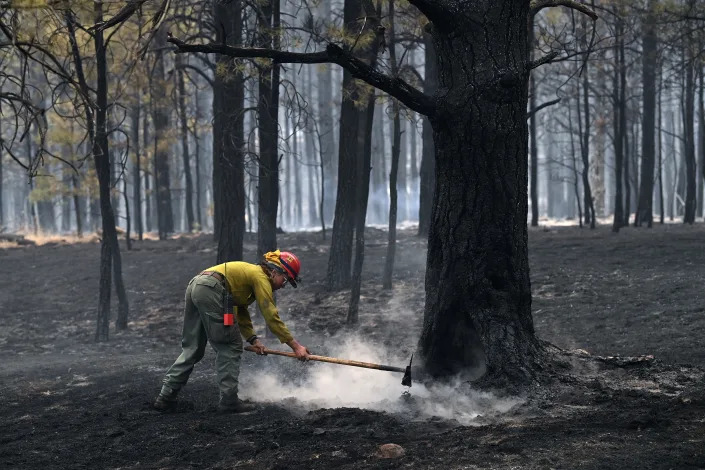Story by The Canadian Press • Yesterday 12:29 p.m.
Imagine sitting down to dinner and cutting into the perfectly cooked piece of wild salmon you just got on sale at the grocery store. But between the layers of succulent pink fillet you pull out a small piece of blue plastic.
The scenario sounds outrageous, but it’s true.
Canada produces more than four million tons of plastic waste each year. And the problem has only become worse since the onset of the COVID-19 pandemic. Takeout containers virtually replaced all the lost restaurant meals, plastic bags were used to carry out or deliver online purchases and single-use utensils and containers became far more common.
Oceana, an international organization dedicated to protecting the world’s oceans, reported in November that the Coca-Cola company increased its plastic packaging by almost nine percent, or 579 million pounds, from 2020 to 2021.
Many of these plastic products end up in oceans. Globally, every minute, the equivalent of one garbage truck full of plastic enters the oceans. Some of this remains in large pieces, trapping and harming aquatic life, while others break down into tiny microplastics which get ingested and end up in marine animals and their blood streams. Currently, there are 51 trillion microscopic pieces of plastic in our oceans, weighing 269,000 tons.
In 2018, the federal government committed itself to fighting plastic pollution. It pledged to reduce unnecessary single-use plastics that make their way into the environment.
“They needed a legal mechanism to be able to do that,” Anthony Merante, Plastics Campaigner at Oceana Canada, said.
In 2021, the federal government took a first step and designated plastic as a toxic substance under the Canadian Environmental Protection Act (CEPA). In order to designate a substance as “toxic” under the CEPA, the material must undergo a broad scientific assessment. From this, it was determined that when plastic makes its way into the environment it is harmful to wildlife and the environment, and, as a result, the designation under the CEPA was granted. Other substances that have been designated as toxic in Canada in the past include DDT, mercury, lead, and asbestos.
“Aside from the science, if you look to any headline, you can clearly see that that is true,” Merante said. “Headline after headline a beached whale has surfaced in Nova Scotia with so much plastic, sea birds entangled in plastic waste. And there's a lot of studies showing that a lot of our fish, especially in the Great Lakes, have plastic in their blood and in the tissue.”
In 2022, the first phase of Canada’s single-use plastic ban came into effect. As of December, there was a ban on the manufacture and import for sale in Canada of checkout bags, cutlery, foodservice ware, stir sticks and some types of straws. According to the prohibition timeline, it will take until December of 2025 for all bans to be in place. These bans would not be possible without the designation of plastic as toxic.
Plastic producers are far from supportive of the CEPA designation. Listing the substance as toxic cuts into the profits of a $35-billion industry by limiting its ability to produce and sell plastics.
As a result, a group of Canada’s largest plastic producing companies, including Dow Chemical, Imperial Oil and NOVA Chemicals, calling themselves the Responsible Plastic Use Coalition (RPUC), backed by American oil companies and the governments of Alberta and Saskatchewan, took the federal government to court three weeks ago, pleading for a judicial review in hopes of overturning the designation of plastic as a toxic substance.
During three days of hearings inside a Toronto Federal Courtroom starting March 7, RPUC stood on the arguments that not all plastic is threatening to wildlife, the current legislation relies on science that has not been proven (certain damages to species and ecosystems from plastics have allegedly not been proven) and that the bigger issue is dealing with plastic waste, not limiting its production. The group also argued that Canada is reading into the CEPA legislation too broadly and therefore overstepping its jurisdiction to impose sweeping bans on plastic products. One of the plastic industry’s main arguments in the case is that the federal government, through its legislation, is disregarding constitutional authority that gives provinces control over waste management.
Despite objections from RPUC, several environmental groups were present to intervene in the case, arguing that the underlying science for the CEPA designation is well founded. Oceana Canada and Environmental Defence, represented by EcoJustice, state their position is crucial and they do not have a financial or institutional stake in the result of the decision, rather they are experts in the science and policy related to the plastic pollution crisis and, more specifically, the CEPA.
The intervenors have warned that a ruling in favour of plastics producers could turn back numerous bans already in place and other broad environmental initiatives could be negatively impacted at a time when extreme action is needed to avoid ecosystem and climate catastrophe.
Critics have pointed out that legal systems and governments around the world have to stop making decisions in support of short-term economic considerations, which often only benefit ownership and investor classes, while the future of the entire planet suffers.
The plastics industry players behind the legal action have launched a campaign to push back against the federal government’s policy initiative.
“The (toxic) label [under CEPA] is not only scientifically inaccurate but could have far-reaching and unintended consequences,” the Responsible Plastic Use Coalition said on its website. “The Coalition opposes the designation of any plastic manufactured items as toxic and believes that the federal government, along with industry and stakeholders throughout the value chain, must work together to innovate and implement tools that will solve the problems of plastic waste.
“The problem Canada is facing is not plastic — its plastic waste. And we believe there are far more impactful policy decisions to divert waste from our natural environment, including a comprehensive circular economy system in Canada.”
Environment Minister Steven Guilbeault pushed back against the powerful plastic industry.
"While a handful of big multinational companies try to stop our ban on harmful single-use plastics, we're going to keep fighting for the clean, healthy environment Canadians deserve," he said in a statement. "We're going to stick to the facts and science and deliver the sustainable options Canadians are asking for."
Current waste management is not equipped to deal with the plastic crisis. In Canada, only eight percent of our plastic waste is recycled. This is due to personal choice and waste infrastructure that cannot handle the need to keep plastic out of the environment.
The governments of Alberta and Saskatchewan claimed the federal government is over-extending its legal power because the provinces play a role in the management of plastic waste under their jurisdiction.
In September, Environmental Defence published a scathing report along with a report card that shows the federal government cannot rely on provincial waste management policy to solve the plastic pollution problem. Only two provinces received a passing grade: British Columbia ©; and Prince Edward Island (D+). The remaining provinces and all the territories received failing grades.
In response to the claim by the RPUC that not all plastic is damaging to the environment, Merante said the science is the evidence. All plastics can break down into microplastics which can be consumed by animals. These microscopic particles then make their way into the bloodstream and flesh. When they enter into water bodies, they impact the chemical composition, do harm to aquatic life and compromise the overall health of rivers, lakes and oceans. This is not disputed, Merante said.
Since its invention in 1907, by the post-war period, plastic has dominated commerce due to its versatility and ease of use. Items that were once made of glass, metal or other more sustainable materials, are now made of plastics. With the onset of the pandemic, single-use plastics became commonplace with the appeal of takeout food, online shopping and the use of disposable masks and gloves for protection.
“Plastic companies are not responsible for what happens after it's purchased? I think that's crazy, because any other product that's put out in the market that causes harm after sale is generally really regulated,” Merante said, criticizing one of the arguments made by the industry. “Cigarettes are highly regulated. Alcohol is highly regulated, because it poses a threat to people. But it seems that when it's the environment, there's kind of a lack of definition of what's impactful.”
Canada is already falling behind on its plastic promises. A target has been set to achieve zero plastic waste by 2030, but Karen Wirsig, Plastics Program Manager at Environmental Defence, told The Pointer back in December that fulfilling this target is not possible. The impact of the bans put in place by the federal government will be relatively small. With all bans in place by 2025, Wirsig said this will only decrease plastic waste by about five percent.
While the bans put in place by the federal government may only be a start, overturning them is not an option if Canada wants to meet its commitments to protect our water and the numerous species being impacted by plastic waste. The production of plastic, which is made from oil, also contributes significantly to global greenhouse gas emissions. Research published by the World Economic Forum shows over the four decades ending in 2015, global plastics production quadrupled and at that rate, “GHG emissions from plastics would reach 15 percent of the global carbon budget by 2050”.
Canadians are a major part of the problem.
“We're a low population, but we use single-use plastic in and by far larger than many other countries,” Merante said. “We are an economy of single-use and throwing out; we do not reuse that often.”
According to him, over 50 countries and many smaller jurisdictions such as states and municipalities, have regulations that fight pollution from the plastics industry. “To turn in the other direction and ignore that and continue polluting is really out of step with what the global population is doing.”
The plastic pollution crisis is designated as the second most environmentally pressing problem, next to climate change, by the UN, and it has direct links to many of the broader environmental challenges we face.
The Ocean Cleanup, a non-profit organization that is developing technologies to clean plastic from the world’s oceans, estimates there are 1.8 trillion pieces of plastic floating in the Great Pacific Garbage Patch, a gyre of garbage in the central-north Pacific Ocean. This is the equivalent of 250 pieces of plastic debris for every human in the world and weighs about as much as 500 jumbo jets.
“I don't think you can find a coastal community in Canada that, no matter what kind of material it is, it ends up in the water,” Merante said. “Bags, coffee cups, lead, cigarette filters, everything makes its way into the environment one way or another, whether it wants to or not.”
Nearly half the world’s surface area is designated as part of the high seas, meaning it is not governed by any nation, resulting in much of the oceans becoming the world’s dumping grounds.
There is hope this could change. On March 5, the UN reached a unified treaty to protect biodiversity in the high seas. This came after two weeks of talks in New York and 20 years of ongoing global discussions for an updated framework to protect marine life. The historic agreement is vital for achieving simultaneous ocean related goals such as the 30 by 30 framework agreed upon at COP 15, which includes sweeping “conservation and management of at least 30% of the world’s lands, inland waters, coastal areas and oceans, with emphasis on areas of particular importance for biodiversity and ecosystem functioning and services” by 2030.
“This action is a victory for multilateralism and for global efforts to counter the destructive trends facing ocean health, now and for generations to come,” the UN chief and Secretary General António Guterres said in a statement issued by a spokesperson after the agreement was reached in early March.
Merante said that Canada has a fundamental responsibility, as the nation borders three oceans and has by far the longest coastline of any country, at more than 265,000 kilometres. The current legal challenge by the plastics industry and two Canadian provinces, arguing the federal government’s designation of plastic as a toxin is not founded, will create one of two precedent-setting outcomes: the court could confirm the legal legitimacy of Canada’s commitment to protect its own natural environment and broader global ecosystems; or it could undo years of recent gains in the fight to protect the planet from devastating industrial pollution.
“Really we have an intrinsic desire to see plastic pollution be reduced and our oceans protected,” Merante said.
After presenting their arguments at the beginning of the month, both sides, and millions around the world, will have to wait three to six months for a decision.
Email: rachel.morgan@thepointer.com
Twitter: @rachelnadia_
Rachel Morgan, Local Journalism Initiative Reporter, The Pointer






























